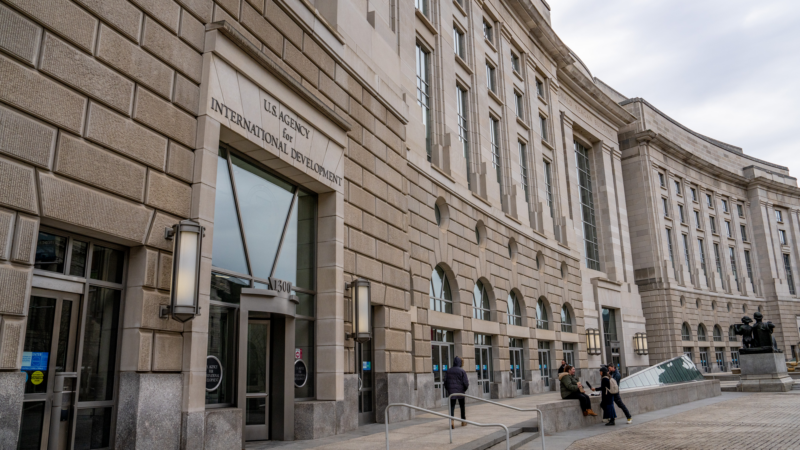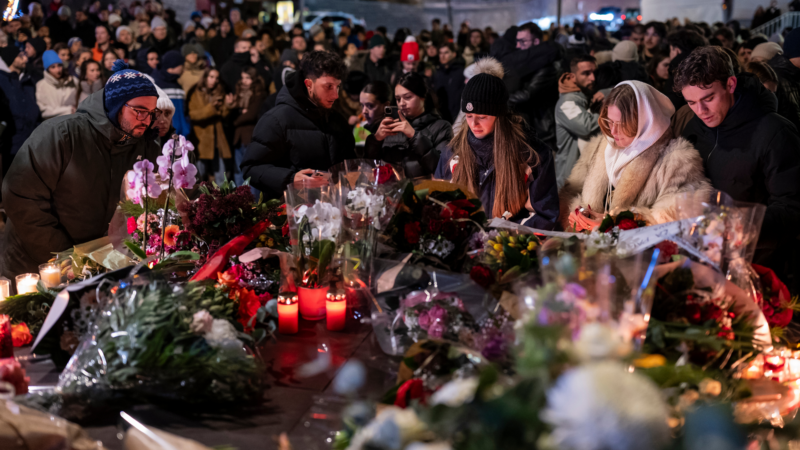Why is the Trump administration targeting USAID?
In just two weeks, the Trump Administration has gutted USAID — the U.S. Agency for International Development — the government agency overseeing global efforts to improve health and education and decrease poverty and hunger.
The systematic dismantling of the 63-year-old agency is a stark contrast to its history of bipartisan support for funding programs like PEPFAR, created by President George W. Bush and credited with saving some 25 million lives.
As a senator in 2019, Marco Rubio, now secretary of state, hailed the agency’s “amazing achievements” in a post on Twitter (now X).
On a trip to El Salvador this week, Rubio took a different perspective, telling reporters: “We fund programs irrespective of whether it’s aligned or not aligned with the foreign policy. That’s ridiculous.”
The actions started with a stop-work order, halting nearly all USAID programs pending a 90-day review.
That was followed by layoffs and a Saturday shutdown of the USAID website, along with an order for workers to stay home on Monday. “We spent the weekend feeding USAID into the wood chipper,” Elon Musk wrote on X on Monday. The billionaire is an adviser to President Trump and is leading a private team called the Department of Government Efficiency, or DOGE.
By week’s end, almost all of the 13,000 staff were put on administrative leave, with only a skeleton staff still working.
The actions were characterized as a “hatchet job” by a senior USAID official who requested anonymity because they are not authorized to speak on behalf of the agency.
That official noted that many people within USAID believe reforms were needed and were willing to work with the administration but have not received any guidance on doing so.
NPR spoke to current and former staff and aid analysts about the possible reasons for this assault on USAID. The White House did not respond to a request for comment.
Why is a global health and development agency suddenly a target?
From Day 1, this Trump administration has been critical of U.S. foreign aid efforts.
U.S. foreign aid organizations “are not aligned with American interests and in many cases antithetical to American values,” Trump wrote in the executive order halting nearly all foreign assistance for 90 days. He added that aid agencies “destabilize world peace” by promoting harmful ideas. Trump did not cite specific programs that weren’t compliant.
Tammy Bruce, a State Department spokesperson, in a Jan. 28 post on X cited “unjustified” foreign aid spending on “family planning,” “gender,” climate-related issues and “learning” (although she did not directly link these programs to USAID).
Susan Reichle, a former senior USAID career officer who worked at the agency under five presidents, says that this targeting of the agency parallels the first Trump administration: “There was a small group [of political appointees] that all of a sudden were attacking USAID’s work on gender, for example, and democracy and human rights.”
Not mentioned in the debate over appropriate spending is the fact that Congress earmarks the programs and locations for USAID spending. When Rubio was in the Senate, for instance, he was the lead sponsor of legislation in 2016 to make sure USAID established and monitored clear goals in line with Congressional priorities.
It’s not just about foreign aid
The changes are part of a significant effort by the Trump administration to reduce the footprint of the federal government and shrink federal spending.
“President Trump stated clearly that the United States is no longer going to blindly dole out money with no return for the American people,” Bruce wrote in a statement about the stop-work order.
Andrew Natsios, who served as the director of USAID under President George W. Bush, agrees that addressing the federal budget deficit “is the most serious crisis. Both Trump and Biden spent us into oblivion. The debt now is out of control.”
But dismantling programs like USAID is “cutting the bone and the muscle of the federal government, because they can’t touch the stuff that’s really been increasing so dramatically,” Natsios told NPR, referring to programs that spend far more than USAID, whose funds represents less than 1% of the federal budget.
“I know what he’s trying to do, but this is not the way you do it,” Natsios said.
Rubio himself expressed a similar view in a newly resurfaced video from 2019: “Anybody who tells you that we can slash foreign aid and that will bring us to balance is lying to you.”
The relatively low profile of USAID makes it a convenient test case for future plans
Natsios believes the agency has been an early target in this campaign to cut spending because of its relative obscurity. “The real reason they chose [to shut down] USAID: Where is the consequence? It’s abroad. People don’t know what’s going on.”
This effort to diminish or dissolve USAID could be a test for dismantling other agencies in the administration’s crosshairs, says Dr. Atul Gawande, former assistant administrator for global health at USAID.
“USAID has become the place where the administration is demonstrating and developing its playbook for eviscerating other targeted agencies,” Gawande told NPR.
“We should be concerned that this is an effort by the Trump administration to unilaterally remake the federal government without congressional authorization,” says Tess Bridgeman, former White House counsel under President Obama, told NPR. “If they feel they can do this with USAID, the question is very real in terms of who’s next.”
Partisan politics is playing a role
On Monday, Feb. 3, President Trump said USAID was run by “radical left lunatics” and that there was “tremendous fraud” going on. He did not provide any details.
Trump also accused the aid agency of stealing “BILLIONS OF DOLLARS” in a post on Truth Social on Thursday. The president alleged massive payouts to news organizations for positive coverage of political opponents; no evidence has been given of any corruption.
Richard Grenell, acting director of National Intelligence under Trump and an envoy in the new Trump administration, alleged in a post on X on Feb. 2 that Samantha Power, who headed the agency under Biden, used USAID money to “fund crazy radical programs and far Left activists,” offering no evidence for the claim.
“USAID, like every other government agency, is nonpartisan,” says former USAID officer Reichle. “I served under five presidents, just as many others across the government have done so, and we take an oath to protect and defend the Constitution.”
Melody Schreiber is a journalist and editor of What We Didn’t Expect: Personal Stories About Premature Birth.
A fire in an Swiss ski resort bar has left about 40 people dead
A New Year's party at a Swiss Alpine bar turned into a tragedy after about 40 people died in a fire and another roughly 115 were injured, many in their teens to mid-20s.
Taiwan’s president pledges to defend island’s sovereignty after Chinese military drills
Taiwanese President Lai Ching-te vowed to defend the self-ruled island's sovereignty in the face of what he termed China's "expansionist ambitions," days after Beijing wrapped up live-fire military drills near its shores.
Deaths reported during widening protests in Iran sparked by ailing economy
The protests began due to economic pressures, with Iran's currency rapidly depreciating. Demonstrators have also chanted against the country's theocracy.
Congress failed to extend Obamacare subsidies. This Democrat says Trump can save them
Sen. Peter Welch, D-Vt., says he thinks the Senate can pass a "retroactive" Affordable Care Act subsidy extension, but "we need President Trump."
Rideshare union rights, social media limits and other state laws taking effect Jan. 1
Every new year, public media reporters across the country bring us some of the new state laws taking effect where they are. Here are six in 2026.
Guides to help you tackle your New Year’s resolutions
From building your strength to tackling credit card debt, NPR's Life Kit has a newsletter journey to help you tackle your New Year's resolution.







